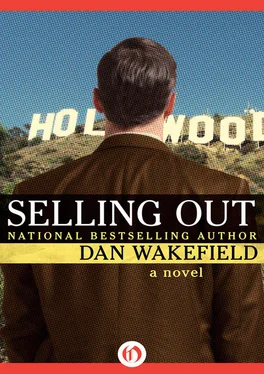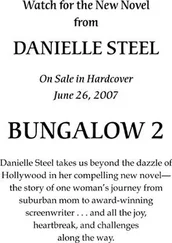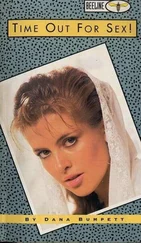Archer in his ponderous elegance paced regally while speaking on the phone about some other pilot, one evidently involving a group of terrorists posing as Parisian prostitutes. He acknowledged Perry with a wave as if from a long distance, or from the deck of a departing ship. Hanging up the phone, he flipped open the sleek attaché case on his desk and began slipping scripts and papers into it. He hardly seemed to notice Perry’s presence in the room, much less his exotic new outfit.
“Are we going somewhere?” Perry asked.
“I’m off to Paris,” Archer said, snapping the clips of his attaché case shut. “Be back by the end of the week.”
Perry jumped up, trembling.
“I thought you wanted to get me started on the second hour immediately!”
“Exactly. Ned Gurney will be here to take you to lunch in a few minutes.”
“Who the hell is he?”
“Ever hear of Spoons? ”
“You mean the Broadway play?”
“Won a Tony, ran for four years. Ned produced it, and he’s been out here trying to get the movie off the ground, but it’s run into some snags.”
“What’s that got to do with me?”
“I heard he was willing to do some television if he found anything of quality. Of course he produced the Willa Cather for PBS, but I mean network. I gave him your script and he read it last night and loved it.”
Before Perry could ask what all this meant, Archer had swung around the desk, and was shaking his hand.
“Congratulations. Ned is coming aboard as executive producer. This adds real class to your project.”
“Wait!” Perry called after Archer, who was striding to the door. “What if I can’t stand this guy? How can I work with him?”
“The man’s a genius. He’s worked with the very best.”
“What if I hate his guts?”
Archer stopped just before he went out the door, and leveled his gaze at Perry.
“Trust me,” he said.
Then he was gone.
To Paris. Leaving Perry to wait for this stranger who was now evidently in charge of his fate, his precious project, his sacred words. He felt as if he’d just been handed over to a new, unknown psychiatrist. Perry sighed and sat down, adjusting his tight new slacks that were riding up on his ass. Well, at least he wouldn’t look like some academic hick from the East, not in his bright yellow pants and purple T-shirt with the silver palm tree.
Ned Gurney was wearing a tweed sport coat with suede patches at the elbows, a button-down shirt, and rep tie. He gave Perry a quick once-over, with a look of slight curiosity, and then the two men shook hands, politely, formally.
The initial meeting of producer and writer was like the first encounter of a couple of dogs of different breeds, cautiously circling, sniffing each other out.
Gurney was a handsome man in his early fifties with longish gray hair that curled up at his neck, and studious, horn-rimmed glasses that matched his ivyish style. He had an air of thoughtfulness about him even as he walked, with hands behind him, head slightly bent, as if studying the atmosphere, so when he commented on the weather it did not seem merely obligatory conversation-filler, but a matter he had actually pondered. The day was brisk, he mentioned, but not like autumn or winter in the East, rather like cool, high mountain air.
When they got to the studio commissary and opened the door, they were struck by the usual clash and clang of silver, as well as the heavy odor of institutional gravy.
Gurney winced, and said, “God, it always reminds me of a hospital.”
Perry smiled.
“Or a high school,” he said.
“Come on,” said Gurney, “let’s get out of here. You game?”
“Delighted. Lead the way.”
Gurney drove them out of the Valley, smoothly and efficiently, without the idiosyncratic flair or urgency of Archer Mellis. Perry relaxed, enjoying Gurney’s driving style, as well as the comfortable dark-blue Cadillac Seville, not a chic car in this world of Mercedes and sleek foreign sports jobs. They went to a restaurant in Westwood that reminded Perry of Boston.
“It’s kind of like the Copley Plaza,” Perry said.
“The food’s all right, nothing gourmet, but what the hell, it’s civilized.”
Whatever Gurney really liked he conferred on it the judgment of “civilized.”
He loved Perry’s script, he thought it was really a rarity for television because it was not only funny and warm and real, it was “civilized.”
“You can’t believe the drek they send me to read,” he told Perry over the glass of white wine each had. “What’s already on the tube is bad enough, but this stuff is poor imitations of it. Nothing original. Hell, I’m tired of sitting on my can waiting for this feature to get put together, but I’d rather be bored than do drek. When Archer Mellis called me and said he had just the thing for me, I’d heard it all before, but when he mentioned your name I perked up.”
Perry perked up himself.
It turned out Gurney had read one of his stories—in the Hudson Review , of all places!
“You really read the Hudson Review? ” Perry asked.
“What the hell,” said Gurney. “I’m a civilized man.”
Perry agreed. He also agreed with the producer’s few suggestions for changes in the first hour of the script.
“It’s the second hour that’s got me stymied,” Perry confessed. “I hadn’t even thought about expanding the story that way till a couple days ago, and I was kind of waiting to talk it over with Archer today, hoping he could help me come up with something.”
“ What if —” Ned said.
Aha. He too was a “what if” man. Perry leaned forward, intently.
“What if,” Ned continued, “instead of Laurie and Jack resolving that little squabble and falling into each other’s arms as you have it now, the argument escalates and Laurie splits.”
“She leaves him? Then there’s no show.”
“Only for a while. Only till she realizes how much she loves him and comes back. In the meantime, Jack is stuck with living with his in-laws, and he and they are blaming each other for Laurie’s leaving.”
“That’s marvelous! My God, I can’t wait to start writing it.”
“The sooner the better. I hope to get the director I want approved tomorrow, and begin casting right away for Jack and Laurie.”
“ Casting? My God, man, I can’t get the second hour written overnight!”
“We don’t need that for casting. It’s still Jack and Laurie’s story in the second hour, isn’t it?”
“Well, sure, but—”
“And you’re not going to change their looks or personalities, are you?”
“Of course not.”
“So, we can start casting them.”
“You sure don’t waste any time,” Perry said admiringly.
“I’m learning that in television we don’t have any to waste,” Ned said. “Decisions on new pilots are made by the networks in May. This is February. We’re already running late.”
Perry slugged down the rest of his coffee as Ned waved for the check.
“You’re going to love this guy we got for executive producer,” Perry proudly told Jane when he called her that night in Vermont.
“What’s he like?” she asked.
Perry thought a moment.
“He’s civilized,” he said. “He’s truly a civilized man.”
“I can’t wait to meet him.”
“I can’t wait for you to get back. Can you make it any sooner, you think?”
“I don’t see how I can do everything in a week as it is. Especially with this god-awful weather.”
It was ten above zero in Haviland. A big snow had fallen just the day before she arrived, and the roads had been cleared just in time for her to get through. If it hadn’t been for Al Cohen’s tramping over to the house in snowshoes to get the furnace going again, the pipes would have surely frozen.
Читать дальше












